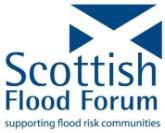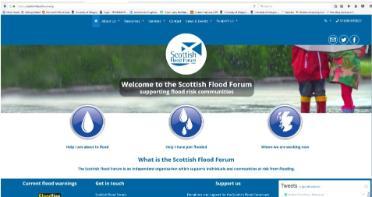Flooding Good Practice Guidance
Published: 1 April 2019
The ‘Good Practice Guidance’ is a series of ‘pick-up and go’ resources to help support those working with flood risk communities before, during and after a flood event, designed and put together by the Scottish Flood Forum (SFF).
Scottish Flood Forum ‘Good Practice Guidance to support engagement with flood risk communities.’

The ‘Good Practice Guidance’ is a series of ‘pick-up and go’ resources to help support those working with flood risk communities before, during and after a flood event, designed and put together by the Scottish Flood Forum (SFF) and funded by the National Centre for Resilience (NCR). The ‘Good Practice Guidance’ can be accessed on the SFF website.
|
Background/Context |
|
In 2015 the NCR asked the SFF to put together a proposal for the development of a toolkit for responders. The toolkit was to help support practitioners to engage with at risk communities, before, during and after flooding. |
|
The work was requested following research carried out by the NCR which identified a need for easy-access ‘pick up and go’ resources. |
The Project
This project began in 2015 with a number of phases in its development.
During phase 1, the SFF identified existing tools and resources available for responders and the gaps that could be filled to support community engagement. They carried out a series of interviews and surveys with front line practitioners—such as Local Authority Resilience and Flood Officers - as part of this process, engaging the end user in the development stages. From this research SFF were then able to create a basic framework which including existing tools and space to house new ones.
Phase 2 included the creation of new tools which were then added to the framework ready for it to be piloted amongst practitioners (phase 3).
The framework was launched on Resilience Direct in April 2017. A promotional campaign followed to make potential users aware of the framework and how to find it. Alongside this, the SFF ran a programme of surveys and interviews with users to find out how useful they found the guidance and to identify how they would like to shape it. The findings of this work were then presented in a report by SFF to guide the next stage of its development as a new resource to help engagement with flood risk communities.
The report concluded that the framework had great potential to be a really useful resource, particularly for those new to community engagement or looking for a refresher. The case studies proved to be especially useful in telling a powerful narrative of engaging flood risk communities. The resources needed more work though—such as a review of the layout, the creation of more case studies and clarification of the target audience, in order to ensure it reflected the needs of key users.
And this lead nicely onto phase 4…
The final phase of this project, undertaken in 2019, was to re-scope the framework as a suite of good practice guidance based on the user feedback. The documents were reviewed, updated and added to, it was then relocated from Resilience Direct to the SFF website to make it more accessible.

Results
The final output of this project is a collection of valuable resources, including case studies and guidance notes, freely available for those working with flood risk communities. These resources are ideal for training new members of staff or supporting the development of existing knowledge. But in turn this will help to:
- Increase overall awareness of flooding,
- Increase skills to prepare for and respond to flooding,
- Increase knowledge of good practice in community led action, and
- Increase community resilience.
The creation of the Good Practice Guidance has produced opportunities for collaboration and partnership working between the SFF and the British Red Cross, The Conservation Volunteers, Aberdeenshire Council and numerous other local authorities. Its promotion and use will generate discussion and engagement around flooding and how we plan and undertake future engagement with flood risk communities.
Flooding is an issue which is not going away, therefore we must find ways of working together to manage it in a way which encourages communities to embrace the BBB ethos; ‘Bounce Back Better’ by building better community resilience.
|
Next Steps |
|
The SFF will continue to update the Good Practice Guidance with new information and case studies. |
|
The SFF will continue to request feedback from users on the Good Practice Guidance through informal feedback and their bi-annual customer survey aimed at community volunteers, groups, responsible authorities and other stakeholders. |
|
Over the next two years the SFF is planning to undertake further research to identify the social impact (particularly any behavioural change) of their work to support flood risk communities. |
First published: 1 April 2019

